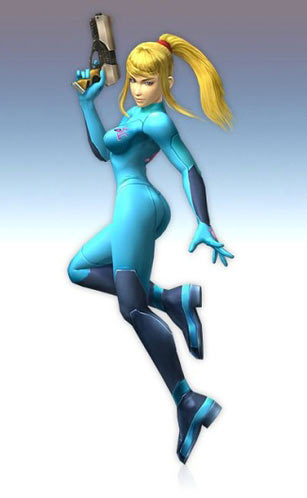
This is very likely true because it's a critical aspect of good writing. In a well-crafted narrative, each person has a purpose, each piece of dialogue has significance, and the relationships between entire cast serve to forward the protagonist's journey.
[aditude-amp id="flyingcarpet" targeting='{"env":"staging","page_type":"article","post_id":682765,"post_type":"story","post_chan":"none","tags":null,"ai":false,"category":"none","all_categories":"games,","session":"A"}']While most every writer has to work with established archetypes, it's satisfying to watch or play as a well-rounded character (for examples from the last 12 months, see Mass Effect 2 and Red Dead Redemption). But as the decades march on, a character type that is indicative of lazy writing continues to inundate the industry: the sex object.
Interesting female leads are a rarity. In title after title, images of ludicrously sexual women assault players: skin-tight clothing, seductive behavior and language, and scenes that play out like the fantasies of a 14-year-old boy.
All of this sends a disturbing message: Women are nothing more than tools that developers can use to gratify the sexual desires of men. And people wonder why so few women become "core" gamers….
Take Mass Effect 2 for example: Even though it's got some great characters, they aren't all as well thought out as the next. Miranda's creators designed her to be genetically perfect: beautiful, athletic, and intelligent. And she's more than that. She has a rich, troubled history riddled with conflicts and decades of family drama. All this is great.
But for some indiscernible reason, BioWare thinks it's necessary to shove into the camera into tight close-ups of Miranda's ass from time to time. This can completely ruin any emotional connection a gamer might have.
Shepard having a conversation with Miranda's ass.
Why do this? This type of shot contributes nothing to the story, tells us nothing about Miranda's character, and adds nothing to the gameplay. The only explanation is that BioWare, in a rare moment of pandering, chose catering to the lowest common denominator over telling a good story — an act that seems all the stranger when you consider Mass Effect's highly regimented sci-fi world.
But maybe they have an explanation. In an interview with Kotaku, Mass Effect 2 project lead Casey Hudson said the following:
[aditude-amp id="medium1" targeting='{"env":"staging","page_type":"article","post_id":682765,"post_type":"story","post_chan":"none","tags":null,"ai":false,"category":"none","all_categories":"games,","session":"A"}']
That's part of her character design, she's the femme fatale. It's part of her character and the fact that she's beautiful and this beauty is part of what helps her. As you get to know her, you realize there's more to her.
I call bullshit. This is a pathetic explanation for a stylistic decision that has nothing to do with story. We don't need to see Miranda's ass to know that she is beautiful.
Of course, Mass Effect isn't the biggest offender. Consider God of War 3, with its (comical?) sex-focused quick-time events that have women fondling each other and directing affirming words toward the player. Hundreds of titles like God of War feature scantily clad women for no reason at all.
Wet is another prime example of this ridiculous obsession. The creators try to parade around the lead character Rubi as a strong, independent woman. She's not. And this may be the most insidious way these kinds of attitudes creep into games. At least God of War isn't trying to pass itself of as something it's not.
Surely the name "Wet" only refers to "wet work"….
[aditude-amp id="medium2" targeting='{"env":"staging","page_type":"article","post_id":682765,"post_type":"story","post_chan":"none","tags":null,"ai":false,"category":"none","all_categories":"games,","session":"A"}']
A male designer and/or a male audience is clearly the reason Rubi looks like she does. Her posture in the promotional material is suspect. Note how her pelvis is pushed slightly out to accentuate her curves. Her tightly wrapped clothes and her weapon holsters add to the effect, and the upward angle of her head makes her neck seem longer and more graceful. The tattoos indicate a target audience in their twenties or early thirties. It seems subtle, but the sexual tension is palpable before you even install the game.
The emphasis on oversexualizing everything is a clear admission that "core" developers are still predominately targeting younger males. This is an obvious mistake given how gaming demographics have shifted (and exploded in general) over the past two decades. Men and women of all ages play video games, and the average user is somewhere around 30 years old.
Because developers don't try to move outside of this narrow demographic, most people don't take video games seriously. In terms of the ongoing "games as art" debate, such practices tarnish the medium. A story isn't worthy of consideration if its creators use flashy window dressing to disguise poor writing.
Women in gaming don't need to look like men or act like them. But the females that people the worlds of Bayonetta, Tomb Raider, God of War, Wet, any fighting game, Grand Theft Auto, racing games, etc. barely meet the minimum requirements of a "character."
